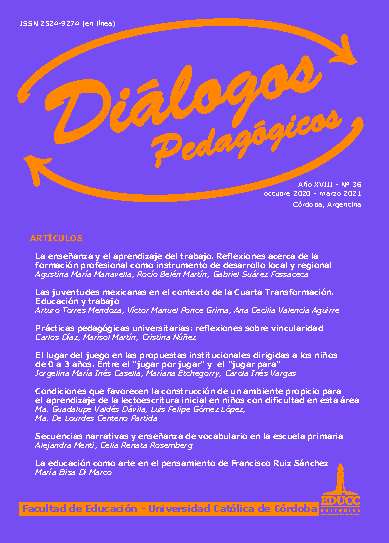Prácticas pedagógicas universitarias: reflexiones sobre vincularidad
DOI:
https://doi.org/10.22529/dp.2020.18(36)03Abstract
This article is presented from the research project Education and Subjectivity:the practices, the curriculum, the knowledge, and the relationships in the productionof subjectivity from the Faculty of Human Sciences, Universidad Nacional de San Luis,in which we have been investigating multiple articulations, dimensions, and relationshipsbetween education and subjectivity.In this work we try to explore the links between teachers and students in thepedagogical practices in health careers of a public university, from some concepts ofrelational psychoanalysis that allow us to think about and analyze the creation ofrelationships between subjects. We start from considering that relationships place theSelf in the situation of having to do the necessary transformations at the presence ofanother, or to pretend that the other becomes absent, disappears, or its specificity iserased.From the analysis of a set of interviews with teachers, we share some observationsabout teachers and students relationships in pedagogical practices and the psychologicalburden involved by being with another: the vicissitudes of somebody's presence andthe creation of differences while trying to blur the Otherness.Keywords: teacher-student relationship, teaching practice.Downloads
References
Berenstein, I. (2002). Del ser al hacer. Curso sobre vincularidad. Buenos Aires:Paidós.
Berenstein, I. (2004). Devenir otro con otros: Presencia, ajenidad e interferencia.Buenos Aires: Paidós.
Freud, S. (1929). El malestar en la cultura. Buenos Aires: Amorrortu.
Han, B. (2017). La sociedad del cansancio. Barcelona: Herder. https://doi.org/10.2307/j.ctvt9k12c
Lacan, J. (1973). Aun Seminario XX. Buenos Aires: Paidós.
Mengue, P. (2009). Deleuze o el sistema de lo múltiple. Buenos Aires: Las Cuarenta.
Mendel, G. (1971). La rebelión contra el padre. Madrid: Península.
Moreno, J. (2010). Tiempo y trauma. Buenos Aires: Lugar.
Nancy, J. (2006). El Intruso. Buenos Aires: Amorrortu.
Narodowski, M. (2016). Un mundo sin adultos. Familia, escuela y medios frente ala desaparición de la autoridad de los mayores. Buenos Aires: Debate.
Piussi, A. (2009). Posibilidad de una escuela de libertad. En P. Aparicio Guadas & J.M. Batalloso Navas, Figuras y pasajes de la complejidad en la educación. Expe-riencias de resistencia, creación y potencia (pp. 169-199). Valencia: Sendas y travesías del pensamiento.
Sztajnszrajber, D. (2016). La docencia como figura de la amistad. Conferencia enel marco del III Encuentro Nacional de Capacitadores: Nuestra Escuela. ProgramaNacional de Formación Permanente. Disponible en: http://lapolchi.blogspot.com/2015/05/la-docencia-como-figura-de-la-amistad_30.html.
Downloads
Published
Issue
Section
License
Copyright (c) 2020 Diálogos Pedagógicos

This work is licensed under a Creative Commons Attribution-NonCommercial-NoDerivatives 4.0 International License.








